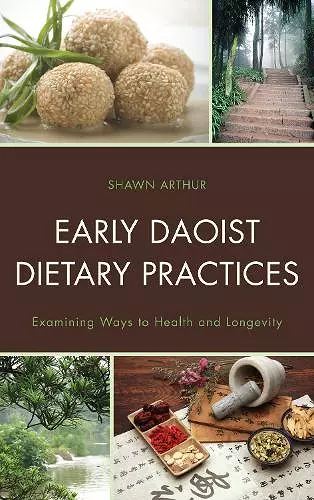Early Daoist Dietary Practices
Examining Ways to Health and Longevity
Format:Hardback
Publisher:Lexington Books
Published:27th Jun '13
Currently unavailable, and unfortunately no date known when it will be back
This hardback is available in another edition too:
- Paperback£56.00(9781498521048)

Much as the modern Western world is concerned with diets, health, and anti-aging remedies, many early medieval Chinese Daoists also actively sought to improve their health and increase their longevity through specialized ascetic dietary practices. Focusing on a fifth-century manual of herbal-based, immortality-oriented recipes—the Lingbao Wufuxu (The Preface to the Five Lingbao Talismans of Numinous Treasure)—Shawn Arthur investigates the diets, their ingredients, and their expected range of natural and supernatural benefits. Analyzing the ways that early Daoists systematically synthesized religion, Chinese medicine, and cosmological correlative logic, this study offers new understandings of important Daoist ideas regarding the body’s composition and mutability, health and disease, grain avoidance (bigu) diets, the parasitic Three Worms, interacting with the spirit realm, and immortality. This work also employs a range of cross-disciplinary scientific and medical research to analyze the healing properties of Daoist self-cultivation diets and to consider some natural explanations for better understanding Daoist asceticism and its underlying world view.
Contemporary Western society is replete with dietary advice, much of it backed by a thriving supplement industry. Nevertheless, increasing numbers of people seek inner balance using guidance from ancient traditions. Centering body movement practices, such as qigong and taiji, are widely known, but information from ancient texts on the relationship between diet and optimal health is harder to come by. This book discusses historical and cultural contexts for a selection of ancient Chinese 'recipes' utilizing various food and herbal ingredients. Arthur (Appalachian State Univ.), who specializes in Chinese religions and 'the intersection of religion, culture, medicine, and the body,' then evaluates the recipes' potential therapeutic value from a modern scientific perspective. Appendixes include lists of recipe titles, proposed health benefits, ingredients, and translations of selected recipes. A Sourcebook in Chinese Longevity, by L. Kohn (CH, Dec'12, 50-2099), also contains a substantive discussion of ancient Daoist dietary practices. Useful for researchers specializing in Daoist traditions relating to health and longevity. Summing Up: Recommended. Graduate students, researchers/faculty, and professionals/practitioners. * CHOICE *
Shawn Arthur’s new book makes a major contribution to the study of both the medicinal and religious cultures of an early collection of recipes . . . Perhaps the most important features of Arthur’s book are the resources he provides to decipher the esoteric vocabulary and hyperbolic claims commonplace in these kinds of texts. . . .This book a useful resource for historians of religion to consult when studying the Wufuxu’s recipes or similar texts of medieval China. . . .Arthur’s contributions . . . make this a very attractive book that historians of China will find helpful to historians of medicine. The appendices, in particular, will help future scholars establish what kinds of pharmacological substances were known among medieval adepts. * Asian Medicine: Tradition and Modernity *
Diet is and always has been an important component of Daoist beliefs and practices and its links to human health and longevity are a topic of widespread contemporary medical and social interest. The author keeps both of these perspectives in view. . . .His findings are wound up by a useful appendix that includes a list of ingredients and a considerable number of recipes in English translation. . . .The author moves into the wider sphere of dietary practice by looking into grain avoidance regimens and their evaluation by contemporary Chinese and Western practitioners. He arrives at certain conclusions in regard to the contemporary significance of medieval Chinese dietary suggestions. Fasting and the vegetal and herbal substances sesame, asparagus root, rehmannia, and pine still play a role. * Religious Studies Review *
Early Daoist Dietary Practices: Examining Ways to Health and Longevity makes a significant contribution to our understanding of medieval Daoist practice, to our appreciation of the concerns of Chinese religious practitioners, as well as to our awareness of food- and health-related practices both historically and today. It provides pertinent arguments, analyses, and insights on all levels—translation, presentation, historical placement, and comparative evaluation—moving from one strong point to the next. It is a must read for anyone interested in Chinese religion and Daoism. -- Livia Kohn, Professor of Religion, Boston University
Shawn Arthur's study of a classical Chinese dietary text explains how Daoists tried to eat their way to immortality and beyond. The Wufuxu, or Explanation of the Five talismans, provides over sixty recipes for long life, perfect health and supernatural powers. What makes this book stand out, however, is that the author has also interviewed Chinese Daoist monks about their dietary practices, and theorized Daoist dietary regimens from the perspectives of contemporary medicine, medical anthropology and evolutionary psychology. By employing a range of theoretical frameworks to ask radical questions about diet, religion and the body, the author breathes new life into a classic text and revitalizes the field of Daoist Studies. -- James Miller, Queen's University, Canada
ISBN: 9780739178928
Dimensions: 235mm x 159mm x 24mm
Weight: 608g
416 pages